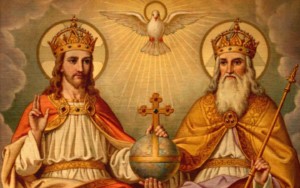Welcome to TOB Tuesdays Refreshed. Over the next few months we will revisit Katrina’s past blogs followed by Jack Henz’* reflection.
Virginity Take 2 by Katrina J. Zeno, MTS
 After a little inter-planetary detour last week to an unusual and unfamiliar planet called “Eucharistic Abstinence,” this week the Enterprise is back on course in its exploration of the outer limits of virginal divinization as our ultimate perfection.
After a little inter-planetary detour last week to an unusual and unfamiliar planet called “Eucharistic Abstinence,” this week the Enterprise is back on course in its exploration of the outer limits of virginal divinization as our ultimate perfection.
We ended Blog 15 with a quote from St. John Paul II’s TOB Audience 15 describing how our bodies as male or female carry within them the natural expression of fruitfulness and procreation in this world as well as a supernatural expression of the “spousal meaning” of our bodies in eternity. This means our resurrected bodies as male or female will gloriously maintain their unitive power in heaven, but in a virginal manner.
At this point, I hope St. JPII won’t mind if I take over the controls of the Enterprise so as to share my unexpected journey of discovering glorified virginity, a journey that began on December 8, 1999.
On that now unforgettable day, I spent six hours meditating on Mary’s Immaculate Conception. As I sat before the tabernacle, I begged the Lord to show me deeper insights into the significance of the Immaculate Conception and its meaning. Eventually, the Spirit directed my thoughts toward Mary’s virginity, prompting me to ask myself, “What is virginity?”
As all of us know, our contemporary culture interprets virginity as the state of someone who hasn’t had sex. However, I wanted to find a way to speak to teens about virginity and chastity that would shake them up, puncture their smug resistance, and motivate their choices even amidst incredibly tempting situations. So, I doggedly kept asking myself, “What is virginity?”
The answer came s l o w l y over the next month: A virgin is ready and able to give him or herself completely to a future spouse. A virgin’s emotional and physical integrity remain available and intact. A virgin’s potential for bonding hasn’t been squandered.
I was navigating in the right direction, but not yet at my journey’s terminus. My definition of virginity was gradually developing from a purely physical definition to one that engaged the whole person. I even began considering how one’s spirit could be virginal even if his or her body wasn’t.
Then I received a new piece of information. Venerable Conchita, a married, lay woman from Mexico, described God the Father in her writings as Virgin Father. Whoa! That took me aback. How could God be Virgin and Father? We speak about Mary as virgin and mother because she never engaged in sexual relations, but what about God the Father? Obviously, the sexual definition didn’t apply to God. There must be something more.
And, indeed, there was. One week into the Great Jubilee of the Year 2000, I was driving from New York to Ohio with eight hours in the car and nothing to do except ponder this question of Virgin Father. Somehow virginity in God expresses an essential attribute of the Divine Nature, but what is it? With a smile I thought: “Thank goodness the Second Person of the Blessed Trinity is a Son and not a Daughter, otherwise there would be endless speculation about reproductive offspring between the Divine Father and Daughter and we would no longer have a Virgin Father.”
But wait! The relationship between the Father and the Son does indeed refer to generation. In the Creed we profess Jesus as eternally begotten of the Father: “God from God, Light from Light, true God from true God, begotten, not made…” God is Father precisely because He begets the Son. The Father’s begetting of the Son, however, is not a matter of sexual reproduction. It expresses an essential element of the Divine Nature: it is a virginal begetting.
As the hills of Pennsylvania flew by, my mind continued pondering Divine Virginity. Since God is Pure Spirit that means Divine Virginity is not a corporeal state, a state of the body, that can be lost. It is a Divine quality that is infinite and undiminishable. It is infinite because Divine Virginity has no beginning and no end. And it is undiminishable because Divine Virginity never decreases or diminishes.
And then it hit me: Virginity in the Trinity is the power for infinite and undiminishable union.
 Thus, no matter how much the Virgin Father gives Himself and His divinity “away” to beget the Son, the Father’s Divinity and His union with the Son is always infinite and undiminishable. And no matter how much the Son receives the Father’s total gift of self and responds with His own Virginal Self-Giving, the Son’s Divinity and union with the Father is also infinite and undiminishable. And their total self-giving and receiving is fruitful – it bursts forth eternally as the Holy Spirit.
Thus, no matter how much the Virgin Father gives Himself and His divinity “away” to beget the Son, the Father’s Divinity and His union with the Son is always infinite and undiminishable. And no matter how much the Son receives the Father’s total gift of self and responds with His own Virginal Self-Giving, the Son’s Divinity and union with the Father is also infinite and undiminishable. And their total self-giving and receiving is fruitful – it bursts forth eternally as the Holy Spirit.
The Holy Spirit, the Virgin Spirit, is the Divine Person who reveals that the union between the Father and Son is virginal and fruitful. He is the virginal bond of love that unites them. In the Trinity, therefore, virginity, union, and fruitfulness are inseparable – virginity never exists apart from union and union never exists without fruitfulness. To me that’s incredibly awesome. Virginity, union, and fruitfulness are inseparable in the Trinity. Right on the turnpike, I was experiencing my own Star Trek moment!
The rain on my windshield providentially brought my thoughts out of the stratosphere and back down to earth. How does all this apply to us as human persons? Even though we are made in the image and likeness of a Trinitarian God, we are certainly not infinite and undiminishable. How, then, does Divine Virginity apply to our human nature? The answer was deceptively simple: we are created to be totally available for union.
Divine Virginity when translated into time, space, and human embodiment as male or female becomes the capacity for being totally available for union. Or, put another way, virginity is the potential in our human nature for perfect union through perfect receptivity through the unitive power of our masculine or feminine body.
Now we can see why JP2 describes our ultimate perfection as a virginal reality. Heaven is where our embodied human nature reaches its fulfillment in perfect union with God through perfect receptivity of God’s total gift of self to us into our glorified bodies, a body whose unitive power is now supernatural and therefore total. (Can you see almost all my favorite words in there?)
Relative to God, our human nature is always virginal. God designed our human nature “from the beginning” with the capacity to receive God into it.
Relative to God, our human nature is always virginal. God designed our human nature “from the beginning” with the capacity to receive God into it. This is the profound truth of the Incarnation (forgive me for spiraling back). Jesus of Nazareth’s human nature received the divine nature into it so there was a perfect union and communion between the two without confusion or separation. The Incarnation was a virginal one-flesh union between humanity and divinity in the body of Jesus Christ. The unitive power of our human nature was fully actualized!
Your human nature and my human nature have this same virginal capacity. The spousal meaning of your (unitive) body was designed from the beginning by God to reach its full actualization by perfectly receiving God into it. In our glorified and spiritualized bodies, this virginal capacity reaches its ultimate fulfillment when we receive God’s personal self-giving of His divinity into us, and, dare we say it, we abide in the Trinity and the Trinity abides in us for the rest of eternity (cf. John 17).
When this occurs, St. JPII says, we will experience a degree of divinization incomparably superior to what can be reached in earthly life (cf. A67:3). This is the understatement of the century! It took me almost two decades of marinating in the language of virginal divinization and TOB to arrive at a description of our ultimate destiny that interweaves the spousal meaning of the body, virginity, the unitive power of the body, and our glorified body. Here it is: “You are created for one-flesh virginal union and communion with the Glorified Body of Christ in your glorified body.” And in being united to the Glorified Body of Christ, each of us is drawn up into the inner life of the Trinity, or, as JP2 says, we experience “full participation in God’s inner life, that is, in trinitarian Reality itself” (TOB A68:4).
Do you feel as if we just went through a meteorite shower, careening to one side and then the other, dropping suddenly down and then unexpectedly pulling up, all the while being thrown around and uncomfortably dislodged in our seats? I realize this spousal language of supernatural one-flesh union can be extremely uncomfortable because one-flesh union and sexual activity are usually inseparable in our minds. So please allow me to put the brakes on and be blunt: IN HEAVEN THERE IS NO SEXUAL ACTIVITY – not with each other nor with God.
Sexual activity belongs to this life only. This is why St. JPII brilliantly describes our eternal union and communion with God as virginal: he makes it crystal clear that our heavenly union and communion with the Trinity in our glorified bodies is spousal, but absent of sexual activity. It is a supernatural, virginal actualization or fulfillment of the spousal meaning of the body. Spousal love and human sexuality as expressions of the unitive power of the body are not absent in heaven, but fulfilled in a radically new and virginal manner, more abundantly than we could ever experience on earth.
“Spousal love and human sexuality as expressions of the unitive power of the body are not absent in heaven, but fulfilled in a radically new and virginal manner, more abundantly than we could ever experience on earth.”
As Catholics, we instinctively understand this language of virginity, union, and fruitfulness through the Blessed Virgin Mary. In Mary, God prepared the most perfect “visual aid” to teach us the profound truth of our own human virginity. We call her “Virgin Mary” not only because she never engaged in sexual relations, but even more fundamentally because she was totally available for union. Through the gift of her Immaculate Conception, Mary was free from the effects of original sin. She was preserved from any defect within human nature that would impede her capacity for being “totally available for union” with God, neighbor, the natural world, and within her very being.
Mary embodies the perfect human expression of virginity, union, and fruitfulness. At the Annunciation, the Holy (Virgin) Spirit overshadowed Mary, drawing her into perfect union with Himself, actualizing her virginal capacity to be totally available for union by receiving the power of the Virgin Spirit into her body. And from that virginal union, a divine-human fruitfulness burst forth – she conceived the Son of God and bore Christ to the world without loss of her virginity. Her holy union and communion with the Divine was fruitful, virginal, and spousal all at the same time. Her virginal union with the Body of Christ in her body foreshadows the deepest essence of the Church and of every person’s vocation.
After four weeks of maneuvering through the ins and outs of the resurrected body, spiritualization, divinization, and virginity, the Enterprise and our brains(!) are due for a well-deserved rest. You may be wondering, though, why does all of this even matter? These topics seem so abstract and futuristic.
These realities are indeed futuristic, but also present moment. As we anticipate our glorified bodies in their eternal masculinity or femininity, this sheds light on the beauty of God’s “binary” design here and now. There will never be a time now, in the future, or in eternity where we evolve “beyond the binary” of man and woman. These are not social constructs but sacramental embodiments that reveal the virginal-spousal meaning of our human nature in both the visible and invisible realms.
“The body, in fact, and only the body, is capable of making visible what is invisible: the spiritual and the divine. It has been created to transfer into the visible reality of the world the [Trinitarian] mystery hidden from eternity in God, and thus to be a sign of it.” – JPII
Perhaps as the Enterprise clicks into place in its docking berth, it would be valuable for us to “click into place” in our minds JP2’s clearest expression of the body’s sacramental ability to make visible what is invisible. In TOB Audience 19:4, John Paul II offers us this sacramental gem: “The body, in fact, and only the body, is capable of making visible what is invisible: the spiritual and the divine. It has been created to transfer into the visible reality of the world the [Trinitarian] mystery hidden from eternity in God, and thus to be a sign of it.” May you revel in the spousal-sacramental meaning of your body for the rest of your life and into eternity! And remember…you are a virginal-spousal gift.
© Katrina J. Zeno, MTS
(Please “share” this blog – and invite your friends to like the JPII Resource Center FB page. Thank you.)
Jack Henz’ Reflection: Weed Removal and Virginal Ponderings
 While Katrina was busy “docking the Enterprise” this weekend, my challenge was to deal with a super-abundance of weeds in my backyard. Fortunately, pulling weeds allows one to think about other matters at the same time.
While Katrina was busy “docking the Enterprise” this weekend, my challenge was to deal with a super-abundance of weeds in my backyard. Fortunately, pulling weeds allows one to think about other matters at the same time.
As I dug into the earth, I admitted to myself I was a little uncomfortable with the “meteorite shower” Katrina navigated us through, culminating in her jarring statement, “You are created for one-flesh virginal union and communion with the Glorified Body of Christ in your glorified body.” However, her immediate clarification that “there is no sexual activity in heaven” eased my discomfort and prompted me to consider the role of virginity in my masculinity and my spousal love within my marriage.
As I wrestled with the weeds, I likewise wrestled with Katrina’s description of virginity as “the potential in our human nature for perfect union through perfect receptivity.” As a man, I’m not prone to contemplating receptivity. I needed additional insight, so I mentally turned to two key sources of masculine formation in my life: “That Man Is You” (TMIY) and “Into the Breach.”
TMIY seeks to help men become “a man after God’s own heart” with Jesus and Mary as role models. It focuses on forming authentic male leadership, practicing self-sacrificial love, re-discovering our love of God, and recognizing that love is a gift. Men are asked to practice these four values in their family, parish, and work-place with a special emphasis on parenthood and a strong spousal union.
Five years ago, I became involved in another men’s ministry, “Into the Breach.” Based on Bishop Thomas Olmsted’s apostolic exhortation of the same name, this program explores how men can be soldiers for Christ and an image of our Heavenly Father. Taken together, these two programs provided a very active male role that I fully embraced and strove to implement within my marriage and family.
Then Katrina’s blog on Virginity Take 2 arrived in my intellectual inbox. The source of my discomfort with Katrina’s blog, I realized, stemmed from overlooking the crucial significance of mutual spousal receptivity. I had been taught to facilitate and encourage my wife’s disposition for receptivity without cultivating this same receptivity in myself. I was now being asking to grow in my own masculine identity in a previously unexplored way.
The resolution of my conflict came when I simply realized that both programs had prepared me to accept contributions from both Jesus and Mary into my masculine psyche. Perhaps I let my acceptance of the role of men as crusaders who defend the family and faith override rather than merge with the equally important role of virginity and spousal receptivity in my union and communion with my wife and ultimately with the Trinity.
I realized that Karen and I had actually shared spousal receptivity with each other in our marriage without recognizing it as a key component in our virginity.
I realized that Karen and I had actually shared spousal receptivity with each other in our marriage without recognizing it as a key component in our virginity. I also didn’t fully recognize the seminal role it was playing in our individual and shared union and communion with God. Fortunately, our mutual “give-and-take” and our “100-percent-both-in” way of living our marriage was already bearing virginal-spousal fruit.
Seven years ago, our oldest son was seriously hurt in a horrible auto accident in Chapel Hill, NC. Karen flew immediately to be by his side and take a first week at helping his wife and he cope. After a week, I flew out to do the same for week two. We alternated weekly trips to help. Our two other sons saw us sacrificing ourselves for their brother and instinctively followed our example – they also took turns caring for him at great personal sacrifice. Their receptivity to their brother in his time of need was palpable.
During this time, we embraced family rosaries and Mass attendance together whenever possible as we knew God had a plan for our family as we carried this cross together with Christ. The increased union and communion experienced within our family was later identified by our two younger sons as key reasons for their return to practicing their Catholic faith.
Little did I envision how active spousal receptivity and virginity was already ingrained in my life. This blog reflection evolved into a personal game-changer that opened my mind in a way that will resonate into my eternity.
Little did I envision how active spousal receptivity and virginity was already ingrained in my life. This blog reflection evolved into a personal game-changer that opened my mind in a way that will resonate into my eternity.
Wow, believe it or not it took me almost three hours of back-breaking bending to rid the backyard of weeds and to gain a richer acceptance of male receptivity in my life. It was just warm enough outside in the sun to become covered with hard-earned sweat and dust. I sat down to admire my work and I heard the porch door close. Suddenly, my wife offered me a cold brew for a job well-done, and I received it joyfully and “virginally.” Now that’s spousal gifting!
©by Jack Henz
We invite you to share your own 2-3 line reflection on our JPII Resource Center Facebook page by clicking here.
*Jack Henz is a retired meteorologist and a graduate of the Diocese of Phoenix ‘s Kino Catechetical Institute. Together with his wife Karen, he is a passionate catechist concerning all things Catholic, especially the Theology of the Body.




